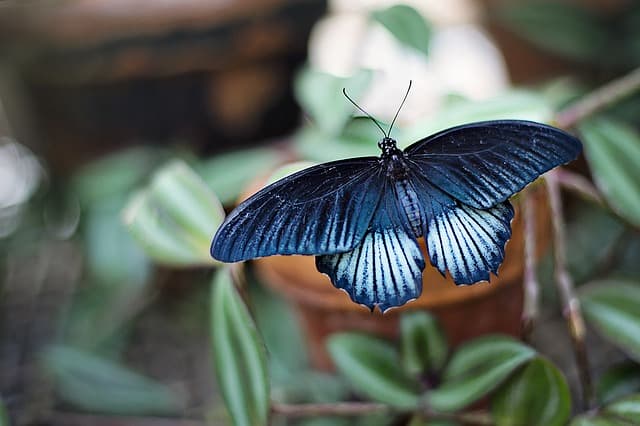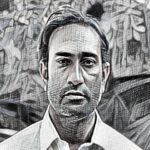Wanderlust
– Fierce Fiction by Habib Mohana – January 13, 2019

Awais had a great thirst for adventure.
During his college days he toured several places with his classmates in a college bus. On television he found the travel shows irresistible and read travel stories ravenously, and each story he went through he fancied himself in the country the story was about. The sight of European backpackers in the tourist resorts made his soles itch. He would buttonhole them and bombard them with questions about their countries. He yearned to explore the world, study foreign cultures and taste exotic cuisines.
He wanted to be a civil officer with a sprawling bungalow, a sienna SUV, an army of servants and then endless world tours. To reach the world of his dream, the upper-lower class young man appeared in several competitive exams over a period of ten years but did not hit the jackpot. Bulky textbooks had sapped his energy. He was about to over-age and he got desperate.
Awais ended up in the chair of a clerk in the agriculture department—his entire world stood topsy-turvy. He was totally demoralized and deflated but with the crisp notes from his first salary in his hands, he went off gallivanting around the country with his old college friends. They went sightseeing, stayed in fleabag accommodations and took amazing shots of themselves with snowy peaks and towering pines forming the background. His best photo—he wore dark Raybans, a maroon shirt and grey pant—he framed in a golden frame and hung it in his modestly decorated bedroom.
He was averse to the idea of marriage. “With this meagre salary one can hardly run oneself let alone the family, the kids, their fees, their medicines and their powders” he often told his parents and relatives. For more than a year they kept wining into his ears and one day he agreed, willy-nilly, to tie the knot with his cousin. She was a no-neck, corpulent lady with a squeaky voice. Within a few years he had a string of children around his neck and he was mired down in the family life. Now he did his hair in the style of the heroes of old movies, he wore inexpensive clothes and to save money he let his beard grow. His meetings with his old friends became less frequent and they often teased him for being henpecked.
“Now he kneads dough and bakes bread for his dear kids.”
“He sings his children to sleep.”
“Be a man, friend, don’t be under her thumb—I mean your other half—otherwise life will become hard for you.”
His friends would rag on him for becoming a recluse.
His office work did not let his mind wander off to the far-off lands he so yearned to travel. But, from time to time his wish to backpack around the world would awaken in his heart and he would make wild plans to fulfil his long-cherished dream. Sometimes his long scrawny fingers would get cramps from constant typing and he would stop clattering the keys of the typewriter. He peeked out of his office window, his tired eyes resting on the leafy trees swaying in the gentle breeze in the lawn, and he would think of exploring the world. He was, suddenly, surrounded by a crowd babbling in strange languages; he sauntered between grey mossy edifices; he walked the hushed corridors of museums where ancient statues gave him stony gazes; and he saw himself lolling in a recliner under a parasol on a white-sand beach, cool breeze playing with his hair. Then his peppery boss’s scratchy voice would wake him up from the ravishing reverie and he would bleat, “yes sir it is ready!”
At the office he was overwhelmed by bulging files and at home the boisterous kids did not give him a break, let alone the verbal sorties his wife, sometimes, launched against him. Things started slipping out of his fingers and he left himself to the caprice of fate. He would not bother much about things. He had managed to make himself comfortable in the slot that destiny had created for him. At home he would watch TV and suck on low-priced cigarettes and at the office he had heated discussions about politics and religion with his colleagues.
Many winters, autumns, summers, springs, sunshines, rains, fogs, windstorms came and flew by, as the ogre of time dredged Awais’s black hair with white.
It was his last day at office. Awais had served for about three decades and he felt sapless and hollow. His colleagues had arranged a party in his honour. Everyone waxed lyrical about Awais’s substantial contribution to the department while the guest of honour listened with moistened eyes. His colleagues handed him farewell presents packed in tinselly wrappers. His boss walked up to him, tied a new fluffy turban around the retiring clerk’s balding head and gave him an affectionate hug. Peering over his thick glasses, Awais thanked his colleagues. Despite his best efforts, tears rolled down his leathery cheeks. He could not tell whether his tears were escaping over leaving his colleagues or over having wasted the bloom of his youth in a dingy office. The ruthless fact of having accomplished nothing great also pinched him.
In his pension papers, there were some wrinkles to be smoothed out. The newly retired clerk paid frequent visits to the District comptrollers’ office, begged the concerned officers to release his gratuity but it lay stuck in the contorted tube of the official procedures. In the end he greased the track of his pension file and got the entries corrected. Anxiously, his family awaited his gratuity. His eldest son was intent on buying a new 250cc bike, his second son had fixed his eyes on a space-age laptop and his two daughters wanted gold jewellery. The longest list of demands came from his wife. Some of his relatives and friends had also locked their ravenous eyes on his gratuity and pestered him, in advance, for a loan.
In the end the government released his twenty lakhs.
A young cashier pushed the money under the glass screen towards him. Awais held the wad of money to his hollow bosom and closed his eyes, whose luster had been sucked by the office files. For a moment he felt as if he was flying over the world and he could see the people of the countries he passed over. He even heard their conversations that were being conducted in unintelligible languages. He smelt the aromas from the foods that were cooking. A torrent of energy flooded his sapped body. He was young and unmarried, unburdened by any responsibility; the fragrance of spring filled his nostrils and lungs.
He mused about the possibility of running away with the money and setting on a world tour without informing his family. He leaned back in the perforated metal bench in the bank, closed his eyes and mulled over the pros and cons of this idea.
Then he saw his two daughters whose dowries had to be purchased and his sons who were out of work and his wife whose hair had greyed in his house, sweeping, scrubbing, washing, cooking.
 Pondering, the newly-retired clerk strode along the bumpy roads for a long time, unaware of the traffic and noise and people around him. He then wandered into a park and smoked countless cigarettes. He gazed at the flowers and they looked as big as umbrellas and the butterflies seemed to him to be made of colored tin. He then lay on his back on the freshly mowed lawn and gazed at the sky. He saw cracks developing in the sky and then he felt as if the sky would shatter into smithereens. To save himself from the falling blue smithereens, he sat up and then hurried out of the park. He resumed his loitering along the road. After swallowing mouthfuls of gritty dust and exhaust fumes, he shuffled into a musty café and drank eight cups of tea, one after another. He closed his eyes, listened to the babble of the customers and he felt as if he was sitting in a foreign country.
Pondering, the newly-retired clerk strode along the bumpy roads for a long time, unaware of the traffic and noise and people around him. He then wandered into a park and smoked countless cigarettes. He gazed at the flowers and they looked as big as umbrellas and the butterflies seemed to him to be made of colored tin. He then lay on his back on the freshly mowed lawn and gazed at the sky. He saw cracks developing in the sky and then he felt as if the sky would shatter into smithereens. To save himself from the falling blue smithereens, he sat up and then hurried out of the park. He resumed his loitering along the road. After swallowing mouthfuls of gritty dust and exhaust fumes, he shuffled into a musty café and drank eight cups of tea, one after another. He closed his eyes, listened to the babble of the customers and he felt as if he was sitting in a foreign country.
He picked up his passport which he, during all this time, had hid under a mound of dusty files in his gloomy office. He phoned his family, “they have not yet released my gratuity. One of my friend’s father is seriously ill, I am going to Islamabad with them….it is an emergency.”
Three days later his family received a call from an unknown foreign number. His eldest son lifted the receiver; it was his father speaking from Iran. The son handed the receiver to his mother. “How the hell did you get there?” the agitated wife barked into the receiver. “Were you drugged and kidnapped or what?”
“No, I came on my own accord.”
“What for?”
“I am on a world tour.”
“Where did you get the money from?”
“Gratuity….I cashed my gratuity, three days ago.’
‘But you told me your gratuity was still stuck…you lied to us?”
“Yes but I had to…now I am in Iran and from Iran I will move on to Turkey and ahead, you know, is Europe. The land of my dreams: green, cool, clean, bright, healthy, rich, educated, beautiful and confident Europe. The land of the free.”
“What? It means, you are going to blow all your money on a goddam world tour! What world tour has got to do with us? The poor folks. It suits the well-healed Europeans who have no headaches. They don’t have to worry about the marriages and engagements of their kids. You are shunning your responsibilities. We all have been waiting for your gratuity. You are so selfish. The dreams we could not fulfil with your monthly salary were supposed to be realized with your gratuity. We all have dreams. Everyone one of us has stacks of dreams.”
“What about my dreams. All my life I kept my dreams interred in my heart. This heart of mine is a graveyard of unrealized dreams. Never ever in my entire life did I cater for my own wishes. I always strangled my wishes at the expense of your dreams. But after this moment, I am not going to spend a single copper on you people. I will spend it on myself. I, me, myself. Enough is enough, I am sorry. I might sound selfish but I am right if you see from my window. All my life, I have been waiting for this moment when I would have some money in my pocket. Money I could call my own. That long-awaited moment has arrived.”
“What better dreams a married man can have than to build his kids a decent house or buy one’s daughters’ dowries and marry them off into respectable families.”
“I don’t care.”
“You don’t care! How selfish of you! You should be ashamed of yourself!”
His sons and daughters stood shell-shocked at this talk between their parents. “Ok, from this moment onwards, don’t call us. It is finished between us.” His wife slammed the receiver into the cradle.
Towards the evening the prodigal son found himself in his house. Awais handed the wad of banknotes to his better half who, screeching with joy, did a little dance. Her daughters lunged at her, snatched the money from her hands and they chased one another, laughing and yelling. The daughters hugged their father shaking him from side to side and then they stamped sloppy kisses on his ashen cheeks. His sons rushed out of their rooms and joined the noisy celebration. Their house rang with happy jubilant voices. But Awais sat silent, distant and aloof, his exhausted eyes focused inwardly. He smelt flesh burning inside him. He was plodding through the charred jungle of his dreams, the dreams he had cherished in his youth. He groped around in smoke and ash but could not find a way out. He fought back a violent urge to utter a piercing scream. But he throttled the monster of screams, he kicked and punched it till it was no bigger than a penny coin. He let the coin go. The coin kept striking against his ribcage as it went down and down, then it dropped into his stomach with a silvery ring. No one could see the dark, frightening chasm time had gouged in his heart. His wife brought him a cardamom-scented bubbly cup of tea. He sipped at the tea and felt as if he was sipping warm water. Then he lit himself a Capstan and puffed at it madly as if he wanted to create a smoke screen between himself and his family, so that they might not notice the cracks that were appearing inside him, the tectonic plates that were ramming into one another at breakneck speed.
“Fate has been so cruel to me! I never tasted the real taste of life. Life would have been so different had I been appointed a civil officer. I would have had all the creature comforts one can imagine. I would have had pleasant people for friends, ambrosial foods for dinners and lunches, and the entire world to tour and explore. Now there is nothing for me to do but to sit and wait at the silent, ghostly terminal of death. I don’t know when my train will arrive.’” Two hot, pearly tears sprang into his eyes but the smoke screen did not let anyone see them.
About the Author of Wanderlust – Habib Mohana
 Habib Mohana is assistant professor of English at government degree college No 3, D. I. Khan. He writes fiction in English, Urdu and Saraiki, his mother tongue. He has four books under his belt, one in Urdu and three in Saraiki. His Urdu short stories have been published in all the prestigious literary journals of Pakistan. His Saraiki novel forms part of MA Saraiki syllabus at Zikria University Multan.
Habib Mohana is assistant professor of English at government degree college No 3, D. I. Khan. He writes fiction in English, Urdu and Saraiki, his mother tongue. He has four books under his belt, one in Urdu and three in Saraiki. His Urdu short stories have been published in all the prestigious literary journals of Pakistan. His Saraiki novel forms part of MA Saraiki syllabus at Zikria University Multan.
In 2010 and 2014, Pakistan Academy of Letters awarded his Saraiki books the Khawaja Ghulam Farid Award. He was born in 1969 in Daraban Kalan, a town in the district of Dera Imsail Khan, Pakistan. His Urdu book of short stories with the title of ADHORI NEEND won the Abaseen award from the Government of KPK. He is looking for a publisher for his novel The Village Café.
–
Did you like “Wanderlust” by Habib Mohana? Then you might also like:
The School Inspector
Working the Fire Line
Target Practice
Shanghai Dumplings
Moshe